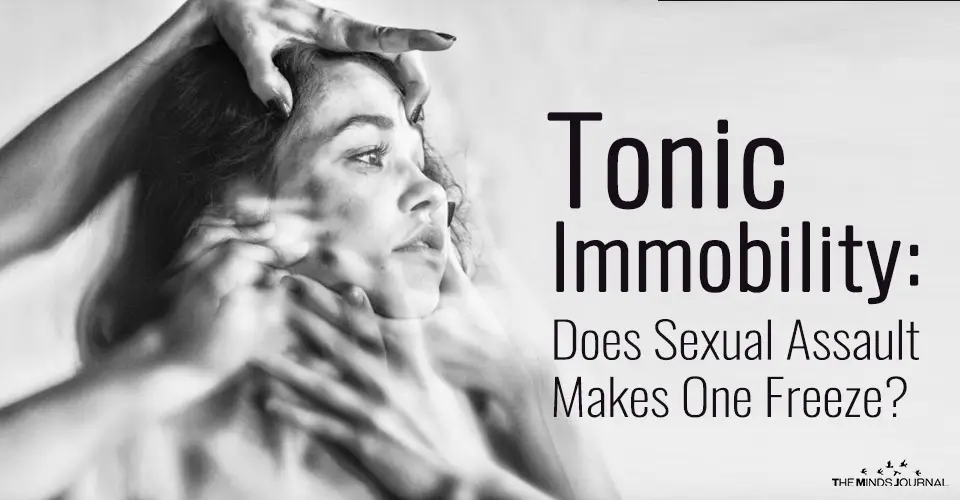Tonic Immobility
 Many sexual assault survivors have one question that plagues them. “Why couldn’t I stop it?”
Many sexual assault survivors have one question that plagues them. “Why couldn’t I stop it?”
Tonic immobility temporally occurs when emotional and physiological distress is experienced during and/or immediately after a traumatic event. Fear or perceived inescapability, before the onset of PTSD symptoms, suggests that tonic immobility may serve as the generative mechanism through which these initial peritraumatic responses promote PTSD.
Fight or flight is a common response to a threat or danger. Your brain triggers these actions to protect you. You might push and shove if a stranger grabs you. Or you might sprint out of the way of an oncoming car. Sometimes a threat can cause you to freeze instead of fighting or fleeing. If you’ve ever been unable to move to protect yourself or call for help, you may have experienced tonic immobility, aka trauma-induced paralysis.
- Tonic immobility is a trauma response. It’s an involuntary inability to move or even speak.
- If you encounter a traumatic situation, you might freeze briefly before defending yourself or trying to escape.
- But if you stay frozen and can’t react, you may be experiencing what is called tonic immobility or trauma-induced paralysis.
- Freezing and tonic immobility are both responses to trauma. Since they have similar characteristics, you might hear the terms used interchangeably. But freezing and tonic immobility are different.
- Freezing occurs at the first encounter with the threat, and tonic immobility is the threat-induced paralysis that leaves you unable to take action.

Tonic immobility is a part of the human defense cascade,
This includes:
- Arousal: the first awareness of a threat
- Fight or flight: an active response
- Freeze: a short delay before fight or flight
- Tonic immobility (paralysis) and collapsed immobility (fainting): the response when the threat is inescapable
- Quiescent immobility: rest and recovery
In animals, tonic immobility activates on contact with a predator. The immobility is to calm the predator’s killing reflex. It can also discourage the predator from eating the prey since carnivorous animals usually prefer live food.
In humans, tonic immobility can occur as a defense reaction to extreme fear.
Tonic immobility is a common response during a sexual assault. In a 2017 study Trusted Source, researchers assessed tonic immobility in 298 females — all survivors of sexual assault — using the Tonic Immobility Scale.
They found that 70% of the females reported experiencing significant tonic immobility, and 48% reported tonic immobility that was “extreme.”
The study also found that tonic immobility was associated with post-traumatic stress disorder (PTSD) and depression 6 months after the assault.
Research from 2016 shows that extreme tonic immobility is more common in people who’ve experienced:
- sexual violence
- emotional abuse in childhood
- accidents
- traumas related to war
If you’ve experienced a similar trauma more than once, it’s possible to skip the flight, fight, and freeze response and go directly from a state of arousal into tonic immobility.
TI is also known as Trauma-induced paralysis. A medical condition that results from severe physical injuries that affect the neural pathways in the human body. These traumatic events can lead to partial or complete loss of muscle function, often characterized by an inability to move or feel sensations in certain parts of the body. It is also known as tonic immobility which is a trauma response. It’s an involuntary inability to move or even speak. If you encounter a traumatic situation, you might freeze briefly before defending yourself or trying to escape. But if you stay frozen and can’t react, you may be experiencing what is called tonic immobility or trauma-induced paralysis. Link Sexual Assault May Trigger Involuntary Paralysis
After a sexual assault, this biological concept freed me from self-blame Story by Cara Gormally
Like many sexual assault survivors, one question plagued me: Why couldn’t I stop it? As a scientist, I’m driven to understand how and why. Learning about a key biological concept transformed what I thought I knew about rape and myself — and gave me hope for how society would treat survivors if more people understood tonic immobility.
|
|











